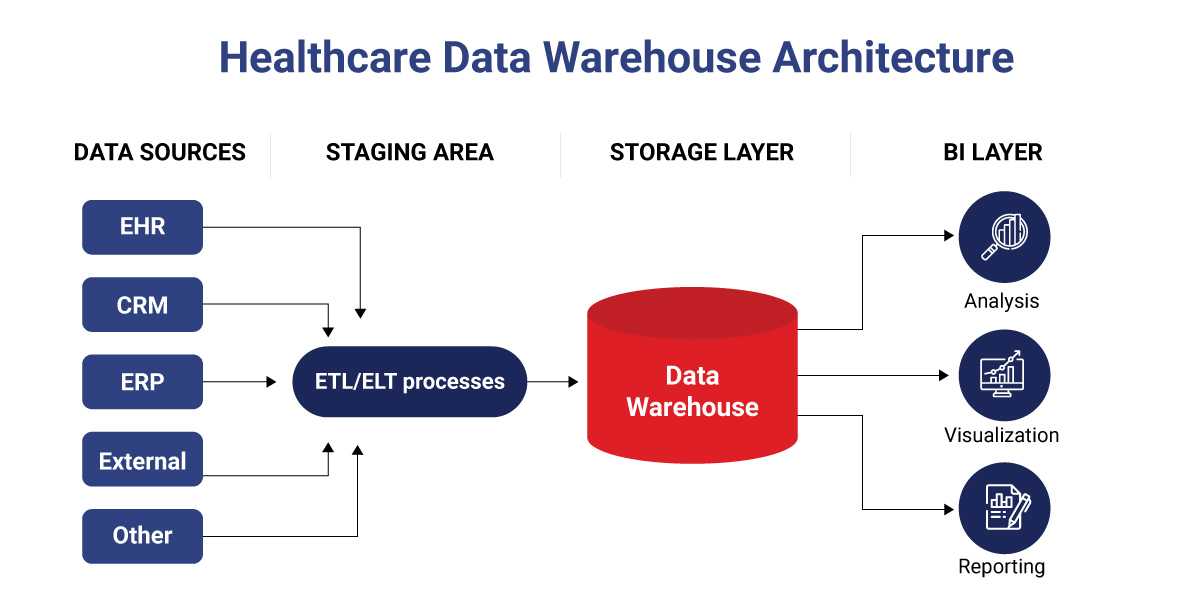Healthcare is an information-intensive sector; organizational and operational decisions are still being taken using traditional electronic healthcare record systems. To fend off data disparities and have a centralized data repository, healthcare organizations are turning to data management and data analytics providers.
As a single source of truth, a healthcare data warehouse catalyzes business growth, streamlining clinical workflows and improving patient outcomes. The global healthcare analytics market is expected to reach over US $121.1 Billion[1] by 2023 from US $ 37.15 billion in 2022.
If you are looking to harness the power of healthcare data with a dedicated data warehouse to obtain value-based care, this post serves as your one-stop reference. It will help you learn how a healthcare data warehouse helps unlock your healthcare data’s potential to drive action where it matters the most.
What is Data Warehousing in Healthcare?
A healthcare data warehouse is a centralized repository for electronic health records and clinical data retrieved from various disparate sources throughout the healthcare enterprise. These sources could range from multiple sources like EHRs, EMRs, enterprise resource planning systems (ERP), radiology databases, wearables, and others. When properly implemented, it can help reduce medical errors, promote patient safety, and support the development of an enterprise-wide EHR. HDW also allows healthcare organizations to store historical patient health data for analysis and research purposes.
Market Overview of Healthcare Data Warehousing
The global healthcare data warehousing market is projected to reach $9.23 billion by 2026[2] The reasons for the rapid adoption of healthcare data warehouses include:
- Rapid data explosion by healthcare providers, pharmacies, and hospitals and the need to protect patient information.
- Broader adoption of EMR, HER and CPOE.
- Rising popularity of connected medical devices because of the need for self-assessment and telehealth technology.
- Increase in cloud, ML, AI, and healthcare IoT adoption.
Therefore, more healthcare organizations are embracing cloud and data warehouse storage to meet the rising volume of data and improve decision-making, extract data-driven insights, and provide better patient care.
Why Do You Need a Healthcare Data Warehouse?
An enterprise data warehouse in healthcare is a single-point platform that offers an end-to-end view of data stored across different systems. It includes – public health records, claims, cost accounting systems, inventory, supply chain, and more.
It enables healthcare organizations to systematically monitor and measure different chronic conditions, care delivery processes, payments, and standard operating procedures. The type of clinical data is constantly increasing and evolving; it has become difficult for organizations to store, share, and analyze their data on time.
A data warehouse in healthcare helps transform organizational data into accessible, actionable information to drive quality improvement across clinical outcomes, patient experience, and operational efficiency. An experienced data analytics company can help you develop data and metrics as valuable assets to improve standardization and transparency.
Here are the key benefits of data warehouse in healthcare:
Single Source of Truth for Analysis
As a central data repository, it is also an on-demand data analytics powerhouse for generating reports to monitor patient’s health, claim-related data, administration, staff performance, and hospital sales. It optimizes reporting and analysis to eliminate duplicate records, errors, and inconsistent information.
From a strategic perspective, one of the key benefits of data warehouse in healthcare is that it enables your organization to use the unified data to extract insights, improve decision-making, optimize resources, and use them for analysis instantly.
Improved Decision Making
A healthcare data warehouse helps overcome siloed data sources and delivers the right insights at the right time. It supports rapid data mining, rapid report generation, and real-time decision support. Your team can rely on the accuracy of the data to improve decision-making. It offers the following features:
- Unified view of your healthcare enterprise data.
- Maintain an analysis-ready form of data to ensure data quality and consistency.
- It provides faster access to historical and real-time data for accurate data analysis and quick decision-making.
- Better decision-making with the managed data that brings outstanding quality, consistency, and accuracy.
- It helps stakeholders across the healthcare organization fully leverage the diversity of health data.
Data Security
Healthcare providers give top priority to protecting patient information. Implementing a healthcare data warehouse can help ensure role-based access controls to secure data. Additionally, you can set up granular security controls to ensure that sensitive business data is only accessible through reports and dashboards.
Regulatory Reporting and Compliance
The healthcare data warehouse aggregates and consolidates various data sources, including patient records, billing information, and administrative data. This consolidated repository simplifies the process of generating precise compliance reports while fortifying data security and privacy through rigorous access controls and encryption protocols. As a result, healthcare establishments can confidently navigate the intricate landscape of regulatory frameworks like HIPAA compliance.
Revenue Cycle Management
The data warehousing in healthcare enables a complete view of the business’s customers’ journey. As a unified data repository, it offers integrated data from billing systems, insurance records, claims, and financial transactions to streamline billing processes, thereby minimizing claim denials, and enhancing reimbursement rates, leading to improved financial performance.
Further, since data integrity validates data accuracy in a healthcare data warehouse, the RCM team need not perform their own calculations; thus, it eliminates rework. It also helps quickly identify the root cause of revenue cycle performance issues and resolve them quickly, resulting in quicker revenue generation cycles.
Data Warehouse Architecture for Healthcare
From the implementation point of view, a healthcare data warehouse model has four fundamental layers built upon each other.

Data Source Layer
This contains medical, clinical, admin, research, patient health information, and other data generated from internal and external data sources. These sources include EHR, EMR, ERP, CRM & claims management systems.
A Staging Zone
This is the temporary intermediary storage that processes incoming data from disparate sources. All the data from multiple sources is processed and undergoes the ELT (Extract, Load, Transform) process to cleanse and transform raw data into consistent data sets.
Data Storage Layer
This layer is centralized storage for structured data for reporting and analysis. It features data marts such as clinical subsets oriented to specific business areas such as accounting, HR, inventory, and operations or specialty areas such as pediatrics, radiology, and intensive care units.
Business Intelligence & Analytics
The final layer in data warehouse architecture for healthcare comprises of BI and data analytics tools for retrieving actionable insights from data. It includes a host of features such as Data mining, reporting, visualization tools, and business analytics to drive predictive, prescriptive, or descriptive analytics.
How to Implement Healthcare Data Warehouse: Roadmap
The process of implementing a healthcare data warehouse can be broadly broken down into four phases. The implementation duration can range from three months for an individual data mart to 2.5 years for a data warehouse. Check out our informative piece of content to deep dive into steps, approaches, and use cases of how to build data warehouse.
Strategic Planning
The planning stage is critical as it centers around the context and strategic aspect of adopting data warehousing in healthcare. The tasks required to accomplish include:
- Defining the needs of the stakeholders.
- Identifying bottlenecks and loopholes in enterprise data management.
- Assessing the existing IT infrastructure.
- Formulating strategic objectives and KPIs that you aim to achieve through the healthcare data warehouse.
- Putting together a vision for the future scope and size of the healthcare warehouse. List out the critical functional and non-functional aspects, including the regulatory compliance, security, and performance requirements.
- Planning a blueprint of the required resources, such as infrastructure, and human resources, that will be required to achieve the vision.
Design
The healthcare data warehouse design stage involves crafting the architecture of the future data warehouse. It also involves designing the necessary data integrations and considering the overall healthcare data warehouse storage model. The tasks to accomplish at this stage include:
- Design the ELT process based on the data integration strategy
- Designing the data model
- Designing data validation procedures
- Designing necessary data integrations
Development and Deployment
This stage focuses on the development of the actual healthcare data warehouse. It involves implementing critical infrastructure components, data warehousing software, and end-user applications. It is important to store and process confidential medical data within highly secure infrastructures (Google Cloud, AWS, Microsoft Azure), ensure dynamic data masking and all-time encryption, multi-factor authentication, penetration testing, restricted data access, and vulnerability assessment.
Testing
After deployment, this stage involves end-to-end testing of the data warehouse and the services that it will be used for. At this stage, schema and data models are implemented on your data storage layer for additional validation after data migration. The migrated data is further scrutinized for data redundancy, errors, contradictions or inaccuracies.
Key Features of a Healthcare Data Warehouse Solution
Healthcare information is vulnerable, and it is necessary to protect confidentiality and integrity against potential threats to the safety and security of digital healthcare information. Therefore, you must prioritize these core features to deliver the benefits of a data warehouse in healthcare:
Data Warehouse Performance
An efficient, reliable healthcare data warehouse comes with a host of performance features that ensure quick data retrieval and seamless data query. To achieve this, you can include
- Scalable cloud resources for on-demand scaling of storage and computation power.
- Automated data backups for rapid, seamless recovery in emergencies or unforeseen calamities.
Data Security, Compliance and Privacy
The security, privacy, and protection of electronic protected health information is vital. Implementing the following key features can help meet compliance for managing Protected Health Information (PHI) data and guarantee robust healthcare data security:
- Implementing IAM (Identity and Access Management) at a granular level ensures that only specific users can access sensitive medical information.
- Limit or restrict data access based on specific jobs
- Implementing MFA. Encryption of healthcare data
- Periodic assessment and detection of threats
- Compliance with relevant regulations (HIPAA, HITECH, FDA)
- Encryption of healthcare data at rest and employment
- Automated backups to help prevent data loss during calamity
Data Integrity
Data integrity means that the data in the healthcare data warehouse is accurate, trustworthy, and consistent. HDWs consist of structured, semi-structured, and unstructured data from EHRs, ERP software, HR management systems, claims management systems, and large public health databases. Therefore, Data integrity or quality is critical in a healthcare data warehouse to maintain data accuracy, reliability, and consistency. Therefore, healthcare organizations should include either ETL or ELT quality controls for data cleaning and validation to ensure data accuracy, completeness, and consistency. This will enable the users to build their own HDW pipelines. To achieve this, you can implement these key processes:
- ELT-based clinical data warehousing integration
- Controlled healthcare data management
- Comprehensive and incremental health data extraction
- Ingestion of big data & streaming data
- Medical data loading & querying using SQL
Data Storage
Healthcare data warehouses should offer integrated, summarized, historical, or subject-oriented data. In addition to offering an on-premise, cloud, or hybrid storage environment, metadata and protected health information (PHI) are key features a healthcare data warehouse must offer.
Common Healthcare Data Warehouse Models
Choosing the best fit depends on several factors, such as the scale of your organization, specialization, and goals you plan to achieve by adopting a healthcare data warehouse. The two popular healthcare data warehouse architecture models include –
- Enterprise DWH
- Individual Data Mart
Enterprise-wide Data Model Approach
Providers can opt for an enterprise-wide data model when they need additional power to keep up with data sets residing in every corner of the organization.
It is one of the most highly recommended models by analytics vendors for medium and large companies. It takes a top-down approach to model a comprehensive database that determines, in advance, the KPIs to analyze for improved patient safety, satisfaction, and treatment outcomes. Additionally, The Enterprise-Wide Model also offers advanced analytics, reporting, and processing tools. This model can be completely tailored to the business processes of a particular region, and therefore this architecture model is ideal if you are building a new database from scratch.
However, when implementing a Healthcare Data Warehouse, you are not building a new system, rather, you are actually building a secondary system that receives data from systems that have already been deployed. However, retrieving data from existing systems and making it work well together is challenging, expensive, and requires the right set of skills.
Independent Data Mart Approach
This approach to the healthcare data warehouse takes a bottom-up approach. A major benefit of this model is the ability to start small and scale up as necessary. Since it enables you to build individual data marts for individual departments, it is a viable choice for smaller healthcare organizations that plan to improve only one or few areas of their business.
Under this approach, you can start small by building individual data marts and scale up when needed. It does not demand significant financial investment or restructuring of your existing digital framework. Accordingly, if you want to analyze insurance claims or revenue cycles, you need to develop an individual data mart for that particular process. Since independent data marts are relatively smaller than enterprise data models, your team can implement the model quickly and track data faster than the Enterprise Data approach.
The independent data mart approach also works more quickly and efficiently than the typical 2–5 year life cycle of the enterprise-wide data model. In the near future, the growth momentum in the analytics-as-a-service (AaaS) and infrastructure-as-a-service (IaaS) market is expected to reduce the upfront costs for healthcare providers and make it affordable to unlock the benefits of big data.
Top-rated Data Warehouse Platforms for Healthcare
There are plenty of options available on the market. However, the following three DWH platforms are shortlisted for their above-average performance and excellent customer satisfaction reviews.
| Amazon Redshift | Azure Synapse Analytics | Oracle Autonomous Database | |
| Ideal For | It has been optimized for datasets that range from a few hundred gigabytes to a petabyte-scale DWH which makes it best for big data warehousing | Apt for implementing a DWH without inviting the additional cost & maintenance issues of an on-premise implementation. It is highly recommended for advanced data analytics | Designed for all business sizes and best suited for, data lake, analytical reporting, and read-intensive databases. An ideal choice for hybrid healthcare |
| Key Benefit | Makes it easy and cost-effective to analyze healthcare data efficiently using your existing BI tools. | As a cloud-based solution, it is ready-to-implement. It enables you to design your DW structure immediately & with absolute ease. | Robust, reliable and easy to integrate with other tools. It efficiently extracts, loads & transforms data across multiple apps. |
| Computing Pricing | $0.25 – $13.04/hour | $1.20–$360/hour | $1.3441/CPU/hour |
| Storage Pricing | $0.024/GB/Month | $122.88/TB/Month | $118.40/TB/Month |
Healthcare Data Warehouses Use Cases
Let’s take a step back and explore real-world examples of data warehouse in healthcare to understand their potential better.
Track Tobacco Use Prevention And Control
State Tobacco Activities Tracking and Evaluation System (STATE)[3] is an electronic data warehouse maintained by the U.S. government containing up-to-date and historical state-level data on tobacco use prevention and control. It integrates many multiple data sources to provide comprehensive summary data and widely used by agencies for current and historical state-level data on tobacco use prevention and control.
Value-Based Care for Diabetes
The US government uses EDW healthcare called the Diabetes Surveillance System[4] that uses data from multiple disparate sources to analyze, interpret, and report on diabetes risk behaviors, risk factors, care practices, morbidity, and mortality.
- HDW is being used to integrate data and correlate social determinants of diabetes, physical inactivity, and factors like risk factors, trends, and pattern identification to reduce the administration time.
- It can provide a comprehensive compilation of diabetes data to support disease management initiatives.
- Provide historical, present, and future trends at national, state, and county levels to estimate the trends of diabetes prevalence and diabetes incidence.
Driving The Power of Data to Enhance Patient Safety
North American Partners in Anesthesia NAPA[5] is a healthcare organization and a collaborative community of expert Anesthesiologists that provide patient-centric anesthesia and pain management care. It has an extensive healthcare data warehouse known as NAPA Data Labs.
It provides clinicians and hospital clients with comprehensive metrics, reports, and dashboards that lead to meaningful analysis. Powerful data and reporting fuel evidence-based decision-making with the potential for broad impact. From improved quality and patient safety to enhanced OR operations, resource utilization, staffing, and growth, discover how data can help increase performance at your facility.
Why Choose Rishabh Software for Developing Health Data Warehouse
Rishabh Software has helped several healthcare organizations expand and revolutionize their healthcare-delivery systems with our custom healthcare software development services. Because data accuracy is paramount to running any healthcare facility efficiently, our data warehouse consulting services ensure that we implement a reliable healthcare data warehouse solution that drives informed decisions and profitable actions in the long term.
We provide end to end healthcare data warehouse expertise that comprises of:
- A fully compliant and secure technical infrastructure
- Industry-leading data analysis tools
- Flexibility to integrate all healthcare data types for SQL-querying
- Ongoing assistance from data science experts
- Scalability of storage and computing resources
- Custom-tailored architecture design
- Seamless integration of EMR, EHR, HIE & CDS systems
- Healthcare data cleaning & migration
- Organized metadata management procedures
- 24×7 Data warehouse maintenance and support
Takeaway
Today most of the clinical and operational decisions are made without sufficient data. However, healthcare organizations recognize the multi-fold benefits of a healthcare data warehouse to help leap forward and deliver patient care. However, setting up a data warehouse requires extensive planning and testing with the scale & volume of data.
Understanding the entire data flow ecosystem is vital to ascertain what fits your requirements, be it a hospital data warehouse or clinical use of a data warehouse. As a business owner, new technologies in healthcare data analytics can seem confusing and even intimidating; therefore, it is always better to consult Data Analytics experts to define business purpose in warehousing, data science, ELT, and more.
Frequently Asked Questions
Q: Is Investing in Medical Data Warehousing a Smart Choice?
A: Investing in medical data warehousing is a wise choice for healthcare organizations. It offers a centralized system to manage patient data from various sources, improving decision-making and patient care. The ability to track trends aids research and planning. Despite initial costs, the long-term benefits of improved data accessibility and insights make it a valuable investment for enhancing overall effectiveness and care quality.
Q: What are beneficial integrations for healthcare data warehouse solutions
A: Integrations help maximize the value and efficiency of the healthcare data warehouse:
- Data Lake: While an enterprise DWH for healthcare can store highly structured data, a data lake works as cost-effective storage of semi-structured and unstructured data (manual patient records, image-based test reports, practitioner’s notes, etc.) The data is parked and stored in data lake before it is called into data warehouse.
- Machine Learning Software: It uses structured data from healthcare data warehouse to train machine learning models (for instance, healthcare demand forecasting). Thereafter, machine learning-powered analytics help in the analysis and decision-making by predicting clinical outcomes and delivering personalized patient care.
- Self-Service BI Software: A self-service BI system enables healthcare organizations to be agile and self-reliant in visualizing, analyzing, and reporting the medical data structured in the EDW. This facilitates quick and easy transfer of analytics insights to key decision-makers.
Q: Data warehouse challenges in the healthcare industry
A: Here are the top three data warehouse challenges in the healthcare industry that make it difficult to implement a data warehouse. Addressing these challenges can help improve patient care, reduce costs, and improve efficiency
- Data Security and Privacy: Protected Health Information (PHI) data is vulnerable to data breaches and cybersecurity threats. It is important to keep health data confidential to meet HIPAA compliance requirements as well as to maintain patient’s trust.
- Data Quality: Healthcare data originates from various sources, often in different formats. Hence, it can often be incomplete, inaccurate, or inconsistent. Integrating this diverse data while maintaining its accuracy and consistency presents a significant challenge. Ensuring data remains current and error-free is crucial for informed decision-making.
- Cost and Scalability: Establishing and maintaining an efficient data warehouse infrastructure demands a significant investment of cost and resources. Healthcare organizations must allocate resources for hardware, software, and skilled personnel. As data volumes continue to grow, scalability becomes an ongoing challenge to ensure system performance isn’t compromised.
Footnotes:
1. https://www.precedenceresearch.com/healthcare-analytics-market
4. https://gis.cdc.gov/grasp/diabetes/DiabetesAtlas.html
5. https://napaanesthesia.com/client-solutions/ground-breaking-programs/











 30 Min
30 Min


